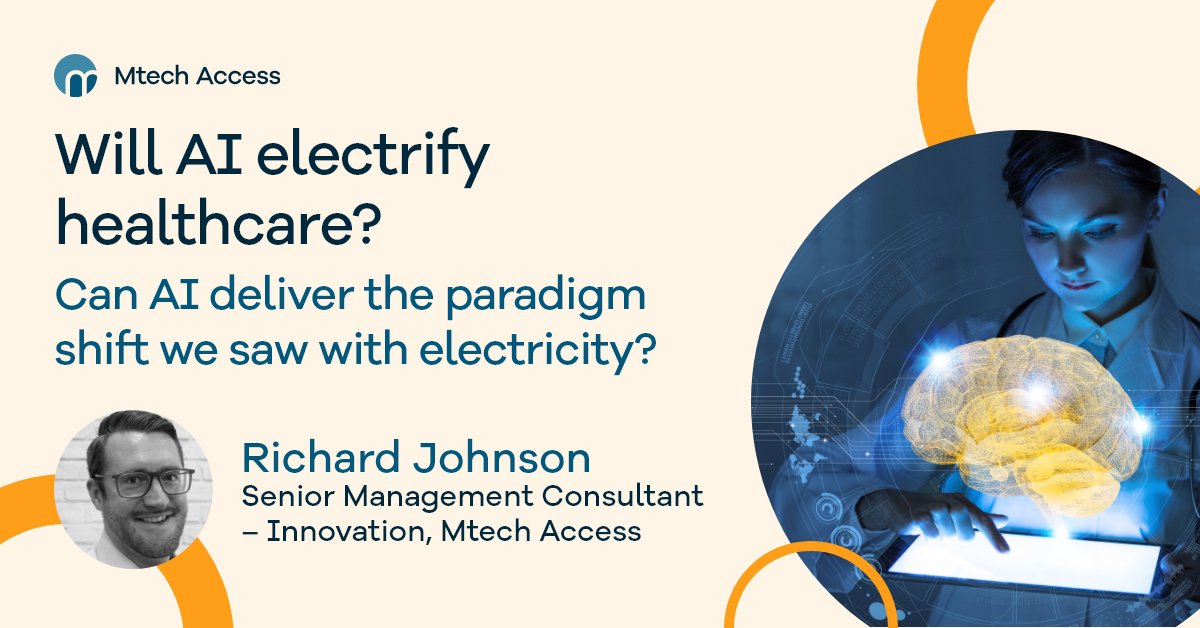
Dr Richard Johnson (Senior Management Consultant – Innovation, Mtech Access) explores how AI will impact healthcare.
***This article has been written by a real human***
Will AI electrify healthcare?
Some might say that AI has already arrived in healthcare, and this is true. There are several applications of the use of AI in medical imaging, drug discovery, and virtual wards [1], amongst others.
There are also applications being considered in market access, in value pricing, understanding formulary decisions, and gathering additional data on drugs [2]. People claim that AI is the new electricity. What does this mean?
Comparisons with electricity: A paradigm-changing innovation
To understand what people mean when they claim that AI is the new electricity, we need to look back in history to understand how electricity changed the world. It became an enabler, and changed how whole industries functioned.
As an example of how electricity changed industries, we can look at the creation of the Model T Ford and the early automobile industry. The first patent for a car was issued to Carl Benz (later forming Mercedes-Benz) in 1886 [4]. So, by the time Henry Ford launched the Model T in 1908 [3] the motor car had been around for 23 years.
However, early mass-produced cars were built in steam-powered factories, with the assembly line built around a steam engine. The challenge with this approach was that the highest-powered parts of the assembly line needed to be closest to the steam engine. Assembly lines were built around the capabilities of the current technology (steam), rather than what was most efficient.
Advances in electrical engineering in the 19th century led to more powerful electric motors, which started to replace steam engines. Electricity doesn't lose power (at least not that much) over short distances. Henry Ford could now build his assembly line however he wanted, increasing efficiencies and reducing costs, to make cars affordable to millions of people [5]. This example shows a paradigm change enabled by electricity.
Will AI change the world?
Currently, we are mostly seeing stepwise applications of AI. That is, applications that make single processes or applications more efficient. These innovations are leading to improved accuracy of predictions and diagnosis, or enabling us to understand new target populations for drugs or interventions. These are simply the first steps in adapting to a new technology, akin to changing from gas lamps to electric lightbulbs.
This has not led to a paradigm change in healthcare yet, but we are seeing this in other industries.
For example, AI applications for automatic directions and traffic routing were first developed to make taxi drivers more efficient, getting them and their passengers from point A to point B faster. Now anyone can be a taxi driver through ride hailing apps. This not only transformed the taxi industry but also led to the development of the gig economy. This example shows a paradigm change enabled by AI.
AI and the UK healthcare sector
In 2021, the UK government set a 10-year strategy to transform the life sciences sector and capitalise on the advances in life sciences development seen during the COVID-19 pandemic.
Within the UK, 300,000 people work within the life sciences sector, and the country hosts four of the world top 10 universities in life sciences, based on QS World University rankings [6].
Life sciences is a key strength and of strategic importance to the UK but, although much improved, there are still painfully slow processes for getting drugs into clinical trials, along with challenges in navigating the approval and reimbursement process in the NHS.
To realise the government's ambition, more can be done to streamline and increase efficiencies in regulation and market access.
The opportunities and potential for AI in healthcare
The Pharmaceutical industry is warming up to the idea of AI. Alongside clinical advances, there are opportunities to speed up regulation and market access data gathering and decision-making by using AI.
However, there are also many unanswered questions on transparency, privacy, and data ownership. The NHS AI lab has been setup to develop AI capability within the organisation [7] and the NICE AI and Digital Regulations Service has been developed to support innovators in navigating the regulatory system [8]. But what about the regulatory system itself?
There are multiple opportunities for implementing AI in different parts of the healthcare system. Not only in clinical care and management, but also in regulation and market access. Taking advantage of these opportunities will enable health systems to benefit from the solutions AI can bring. However, these opportunities should be considered alongside important questions on transparency, privacy, data ownership, and fairness.
A new AI paradigm shift in healthcare
We are still just improving efficiencies with AI (akin to converting gas lamps to electric lamps). There are opportunities for AI to create paradigm shifts in how clinical evidence is created, analysed and interpreted.
One can envision a future where AI supports clinical trial selection and recruitment, reducing risk for participants. Through detailed analysis, AI may be used to understand and target treatment directly to the patients who will benefit most, reducing unwanted side effects and unsuccessful outcomes.
Personalised treatments will create a paradigm shift in regulation and market access, with Pharmaceutical and Medtech companies working above brand on treating diseases, rather than selling individual interventions.
Blockbuster drugs will be rare and portfolios of interventions will be more important. Indeed, blending Medtech and Pharmaceutical technologies to test, target, and treat diseases should produce better outcomes for patients.
This paradigm shift requires a different way of thinking. We will move from individual drug candidates going through lengthy and costly trial and approval processes to portfolios of drugs, maybe only with slight modifications. These drugs will be designed to treat different target populations, as part of a wider, disease-led portfolio, providing personalised healthcare and better outcomes.
We learnt from the COVID-19 pandemic that multiple efforts aligned to the same goal can create interventions that bring impact at scale. A single vaccine or single intervention is not the best way to 'cure' the world.
With portfolios of interventions targeted to treat a singe disease, the implication of one point of failure is lower and the risk is spread across the portfolio. Ultimately, this provides better choice and outcomes for patients, and lowers risk.
What do you think will be the first paradigm change, driven by AI, in healthcare?
Richard and our wider innovations team would love to hear your perspectives on the future of AI in healthcare. The team are conducting research into how the life sciences and health sector can best harness AI to drive efficiencies and improve outcomes for healthcare systems and patients. To share your views, to learn more, or to contribute to our research, please email info@mtechaccess.co.uk.
For more on AI in healthcare, life sciences and market access:
- Watch our on-demand webinar: ‘Artificial intelligence (AI) in clinical trials: Implications for evidence synthesis and market access’
- Read: ‘The potential of AI in market access and HEOR’ – a response from ChatGPT
- Discover: ‘Apps, platforms and AI – digital innovations in market access’ – an interview with Richard White (Lead Developer, Mtech Access)
References:
1) NHS Transformation Directorate. Artificial Intelligence. 2023. Available from: https://transform.england.nhs.uk/information-governance/guidance/artificial-intelligence/. Accessed on: 4 September 2023.
2) Bates, A. AI use in Pharma. PM Society Market Access Interest Group Meeting. 23 May 2023; London, UK.
3) Ford. Company Timeline. 2020. Available from: https://corporate.ford.com/about/history/company-timeline.html. Accessed on: 4 September 2023.
4) Benz, C. Vehicle with gas engine operation. Patent DE37435C, Germany, 1886.
5) Goldfarb, A. How prediction builds better business insights. 2019. Available from: https://hbr.org/webinar/2019/05/how-prediction-builds-better-business-insights. Accessed on: 4 September 2023.
6) ABPI. Life sciences superpower, growing the leading global hub in the UK. 2023. Available from: https://www.abpi.org.uk/r-d-manufacturing/building-a-thriving-environment-for-medicine-discovery/life-sciences-superpower-growing-the-leading-global-hub-in-the-uk/. Accessed on: 4 September 2023.
7) NHS Transformation Directorate. The NHS AI Lab Accelerating the safe adoption of artificial intelligence in health and care. 2023. Available from: https://transform.england.nhs.uk/ai-lab/. Accessed on: 4 September 2023.
8) NICE. One-stop-shop for AI and digital regulations for health and social care launched. 2023. Available from: https://www.nice.org.uk/news/article/one-stop-shop-for-ai-and-digital-regulations-for-health-and-social-care-launched. Accessed on: 4 September 2023.


